Lesson 10 Does she always come before six thirty? 课件
文档属性
| 名称 | Lesson 10 Does she always come before six thirty? 课件 |
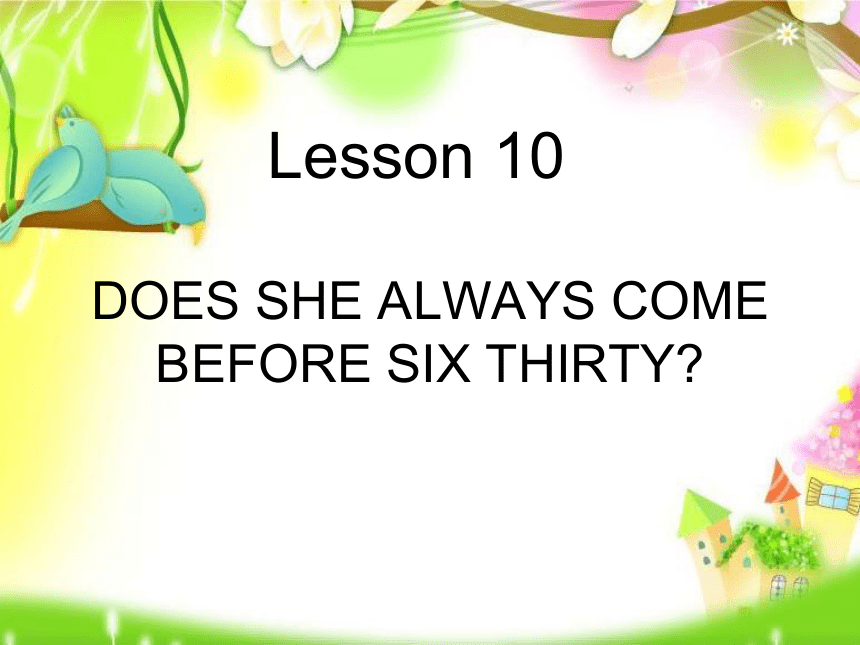
|
|
| 格式 | zip | ||
| 文件大小 | 264.0KB | ||
| 资源类型 | 教案 | ||
| 版本资源 | 科普版 | ||
| 科目 | 英语 | ||
| 更新时间 | 2017-01-03 00:00:00 | ||
图片预览


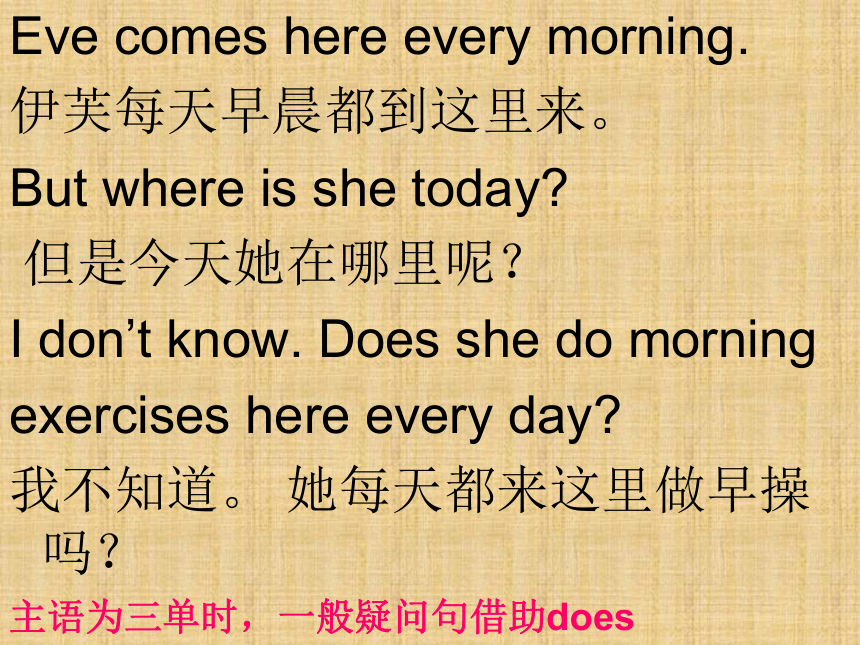
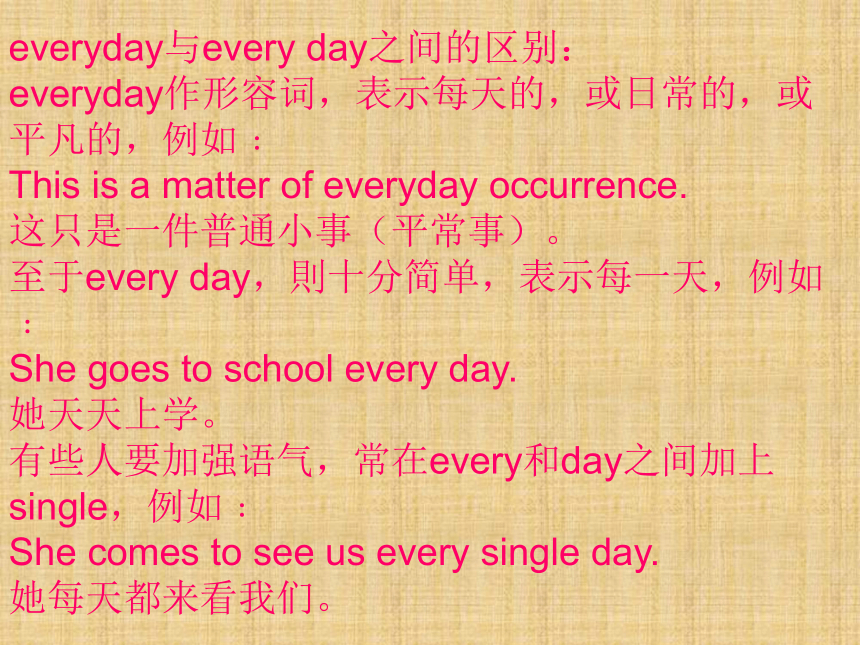
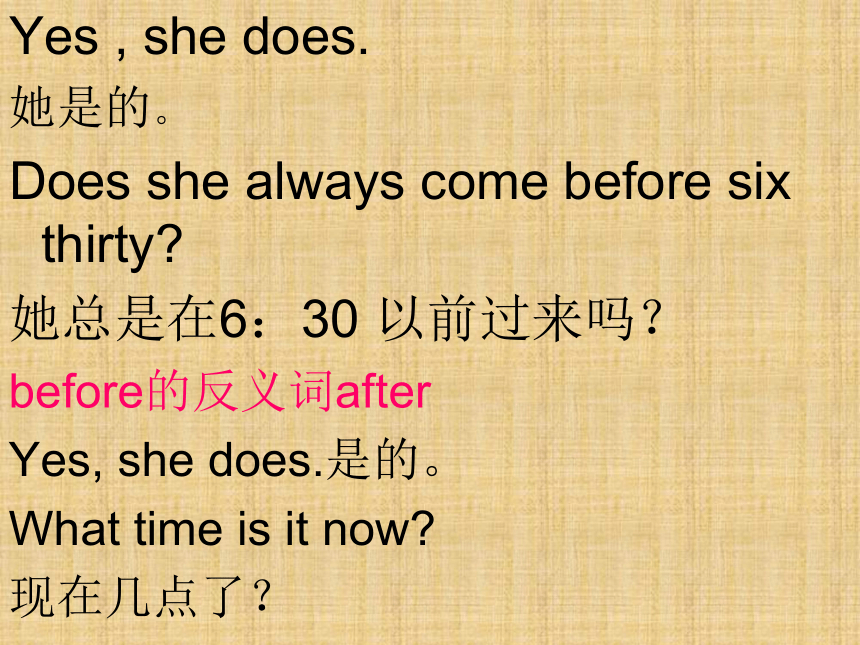
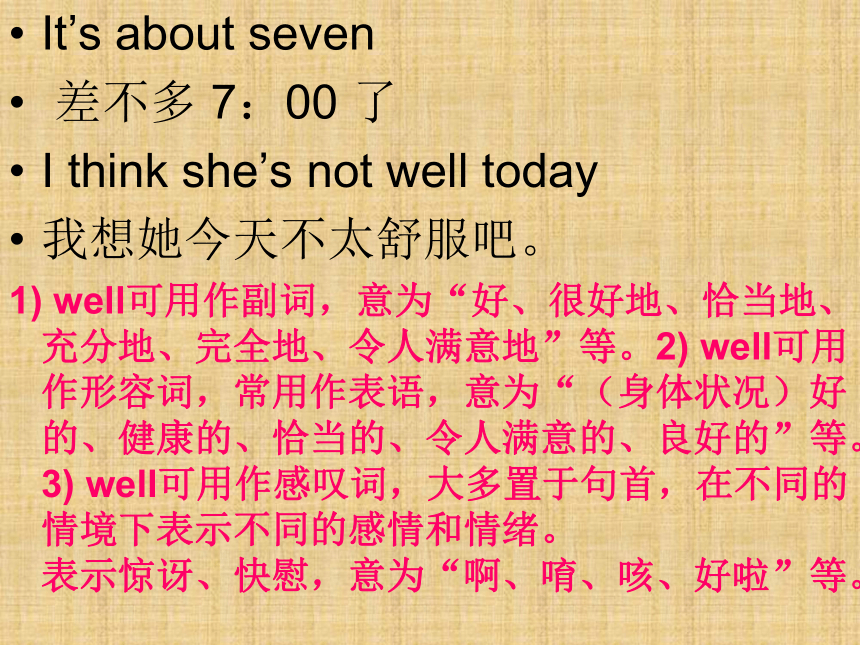


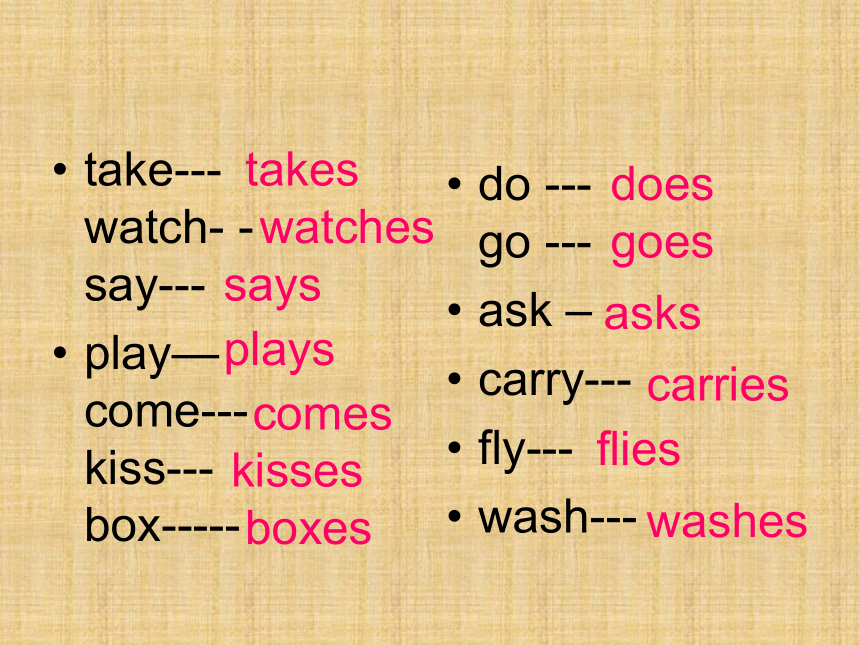
文档简介
课件23张PPT。Lesson 10DOES SHE ALWAYS COME BEFORE SIX THIRTY? Let’s talkEve comes here every morning.
伊芙每天早晨都到这里来。
But where is she today?
但是今天她在哪里呢?
I don’t know. Does she do morning
exercises here every day?
我不知道。 她每天都来这里做早操吗?
主语为三单时,一般疑问句借助does everyday与every day之间的区别: everyday作形容词,表示每天的,或日常的,或平凡的,例如﹕ This is a matter of everyday occurrence. 这只是一件普通小事(平常事)。 至于every day,則十分简单,表示每一天,例如﹕ She goes to school every day. 她天天上学。 有些人要加强语气,常在every和day之间加上single,例如﹕ She comes to see us every single day. 她每天都来看我们。 Yes , she does.
她是的。
Does she always come before six thirty?
她总是在6:30 以前过来吗?
before的反义词after
Yes, she does.是的。
What time is it now?
现在几点了? It’s about seven
差不多 7:00 了
I think she’s not well today
我想她今天不太舒服吧。
1) well可用作副词,意为“好、很好地、恰当地、充分地、完全地、令人满意地”等。2) well可用作形容词,常用作表语,意为“(身体状况)好的、健康的、恰当的、令人满意的、良好的”等。3) well可用作感叹词,大多置于句首,在不同的情境下表示不同的感情和情绪。 表示惊讶、快慰,意为“啊、唷、咳、好啦”等。Let’s call her, OK?
我们给她打个电话吧,好吗
OK. Let’s go.
好的。 我们走吧。 Let’s learntake--- watch- - say---
play— come--- kiss--- box-----do --- go ---
ask –
carry---
fly---
wash---
takes
watchessaysplays comes
kissesboxesdoes
goesaskscarriesflies
washestake a walk散步
after supper晚饭后
do sports做运动
in the afternoon在下午
watch TV看电视
in the evening在晚上
利用上面的短语造句
Does Lele …….. let’s chant
I try to do my best each day,
In my work and in my play.
无论是工作还是玩乐,每天我都尽我最大的努力
Try to do sth尝试做某事
each day每天
do one’s best尽某人最大努力 And if I always do my best.
I needn’t worry about my test.
如果我尽我最大的努力,我就不需要担心我的考试
worry about担心Read for fun A barking dog doesn’t bite 会叫的狗不咬人。 Mr brown goes for a walk after supper every day.
布朗先生每天晚饭后都要出去散步。
go for a walk 散步 =take a walkAnn, put on your hat and let’s go for a walk.
安,戴上你的帽子,我们出去散步去。
put on 穿上,戴上 put on your coat=put your coat on
但put on后接代词时,如it,them ,则必须将it them放在put与on之间
反义词:take off 脱下,摘下
Father, I’m ready.爸爸,我好了。
Sometimes he asks his daughter Ann to go with him
有时,他会让女儿安和他一起去
ask sb. to do sth.. 让某人去做某事。 如: Mother asks me to study hard. 妈妈让我好好学习。 Ann is happy to go out with her father
安很乐意和爸爸一起出去。 be happy to do sth愿意做某事,很高兴做某事
eg: We are happy to see you again
go out 出去 Father, I’m afraid of the dog.
爸爸,我害怕狗。 ①be afraid of sth.害怕某物。如: Are you afraid of snakes? 你怕蛇吗? ②be afraid of doing sth.担心做某事后出现某种后果。如: She was afraid of waking her husband up. 她怕吵醒她的丈夫。(担心,希望丈夫多睡一会) ③be afraid to do sth.害怕做某事。如: She was afraid to wake her husband up. 她怕吵醒丈夫。(害怕,丈夫可能生气) Suddenly they see a big dog.
突然,他们看到了一条大狗。
The dog begins to bark.
那条狗朝着他们狂叫。 begin to do sth 开始做某事
begin后还可以接动名词来表达同样的意思 Don’t be afraid, Ann.别害怕,安。
Don’t you know the old saying “A barking dog doesn’t bite”?你不记得那句谚语了吗---------会叫的狗不咬人?
Don’t you…..难道你。。。 反意疑问句,它 的答语比较特殊,用“yes”回答的,译为“不” “no”译为“是”
eg: Don’t you do your homework?
难道你没做家庭作业?
No,I don’t是,我没做Oh, yes . I know it. But does the dog know it, too?
记得,我知道。 但是狗也知道这句谚语吗? Thank you!
伊芙每天早晨都到这里来。
But where is she today?
但是今天她在哪里呢?
I don’t know. Does she do morning
exercises here every day?
我不知道。 她每天都来这里做早操吗?
主语为三单时,一般疑问句借助does everyday与every day之间的区别: everyday作形容词,表示每天的,或日常的,或平凡的,例如﹕ This is a matter of everyday occurrence. 这只是一件普通小事(平常事)。 至于every day,則十分简单,表示每一天,例如﹕ She goes to school every day. 她天天上学。 有些人要加强语气,常在every和day之间加上single,例如﹕ She comes to see us every single day. 她每天都来看我们。 Yes , she does.
她是的。
Does she always come before six thirty?
她总是在6:30 以前过来吗?
before的反义词after
Yes, she does.是的。
What time is it now?
现在几点了? It’s about seven
差不多 7:00 了
I think she’s not well today
我想她今天不太舒服吧。
1) well可用作副词,意为“好、很好地、恰当地、充分地、完全地、令人满意地”等。2) well可用作形容词,常用作表语,意为“(身体状况)好的、健康的、恰当的、令人满意的、良好的”等。3) well可用作感叹词,大多置于句首,在不同的情境下表示不同的感情和情绪。 表示惊讶、快慰,意为“啊、唷、咳、好啦”等。Let’s call her, OK?
我们给她打个电话吧,好吗
OK. Let’s go.
好的。 我们走吧。 Let’s learntake--- watch- - say---
play— come--- kiss--- box-----do --- go ---
ask –
carry---
fly---
wash---
takes
watchessaysplays comes
kissesboxesdoes
goesaskscarriesflies
washestake a walk散步
after supper晚饭后
do sports做运动
in the afternoon在下午
watch TV看电视
in the evening在晚上
利用上面的短语造句
Does Lele …….. let’s chant
I try to do my best each day,
In my work and in my play.
无论是工作还是玩乐,每天我都尽我最大的努力
Try to do sth尝试做某事
each day每天
do one’s best尽某人最大努力 And if I always do my best.
I needn’t worry about my test.
如果我尽我最大的努力,我就不需要担心我的考试
worry about担心Read for fun A barking dog doesn’t bite 会叫的狗不咬人。 Mr brown goes for a walk after supper every day.
布朗先生每天晚饭后都要出去散步。
go for a walk 散步 =take a walkAnn, put on your hat and let’s go for a walk.
安,戴上你的帽子,我们出去散步去。
put on 穿上,戴上 put on your coat=put your coat on
但put on后接代词时,如it,them ,则必须将it them放在put与on之间
反义词:take off 脱下,摘下
Father, I’m ready.爸爸,我好了。
Sometimes he asks his daughter Ann to go with him
有时,他会让女儿安和他一起去
ask sb. to do sth.. 让某人去做某事。 如: Mother asks me to study hard. 妈妈让我好好学习。 Ann is happy to go out with her father
安很乐意和爸爸一起出去。 be happy to do sth愿意做某事,很高兴做某事
eg: We are happy to see you again
go out 出去 Father, I’m afraid of the dog.
爸爸,我害怕狗。 ①be afraid of sth.害怕某物。如: Are you afraid of snakes? 你怕蛇吗? ②be afraid of doing sth.担心做某事后出现某种后果。如: She was afraid of waking her husband up. 她怕吵醒她的丈夫。(担心,希望丈夫多睡一会) ③be afraid to do sth.害怕做某事。如: She was afraid to wake her husband up. 她怕吵醒丈夫。(害怕,丈夫可能生气) Suddenly they see a big dog.
突然,他们看到了一条大狗。
The dog begins to bark.
那条狗朝着他们狂叫。 begin to do sth 开始做某事
begin后还可以接动名词来表达同样的意思 Don’t be afraid, Ann.别害怕,安。
Don’t you know the old saying “A barking dog doesn’t bite”?你不记得那句谚语了吗---------会叫的狗不咬人?
Don’t you…..难道你。。。 反意疑问句,它 的答语比较特殊,用“yes”回答的,译为“不” “no”译为“是”
eg: Don’t you do your homework?
难道你没做家庭作业?
No,I don’t是,我没做Oh, yes . I know it. But does the dog know it, too?
记得,我知道。 但是狗也知道这句谚语吗? Thank you!
同课章节目录
- Lesson 1 May I speak to Mary?
- Lesson 2 We mustn't cross the street now
- Lesson 3 How many pupils are there?
- Lesson 4 Where do you live?
- Lesson 5 What do you do?
- Lesson 6 Revision
- Lesson 7 It's seven thirty-five
- Lesson 8 What day is it today?
- Lesson 9 Do you always have lunch at twelve?
- Lesson 10 Does she always come before six thirty?
- Lesson 11 When do you usually get up?
- Lesson 12 Revision
